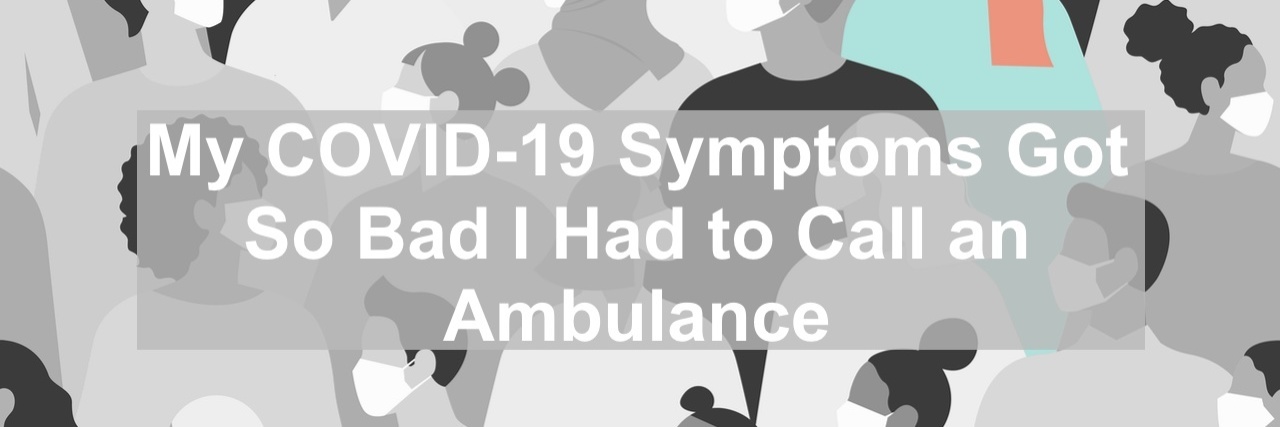I Live in the U.K. and Got Diagnosed With COVID-19
Editor's Note
Join The Mighty’s Coronavirus group to connect with other Mighties living through the pandemic. Read the latest updates, share helpful tips, or give and receive virtual support.
Coronavirus Chronicles is a new series from The Mighty sharing the human stories behind the pandemic. In this edition, a 32-year-old woman from West Yorkshire, U.K. shares her experience with COVID-19.
My symptoms developed slowly, and I began to feel tired and generally unwell on March 13. A fever of 39 degrees Celcius (102.2 Fahrenheit) developed a few days later. I would cough a little in the morning and bring up a bit of phlegm, however, that was it. I never suffered from a persistent cough.
I have a prior diagnosis of chronic fatigue syndrome and I did experience an increase in fatigue as my symptoms began. The fatigue left me unable to leave my bed and my whole body aches felt twice as heavy as normal.
After a few days rest in bed, I remained feeling unwell and then I began to get pains on the right side of my chest. This was behind my breast and over the next few days, became increasingly worse. Every breath I took felt like glass was in my right lung, which I managed by avoiding deep breathes. I experienced headaches in the early stages of the illness through to the peak of it when I was admitted to the hospital. The headaches were heavy, like a dull ache.
Six days after my symptoms started, I woke in the early hours struggling to breathe. The pain in my chest was so excruciating that I began to panic instantly. I called for an ambulance and was taken to the hospital. My oxygen levels were low and my blood tests showed high levels of infection on arrival. The pain was increasing by the minute and it was at this point that I suffered from one episode of sickness and diarrhea.
I rolled around on the bed in absolute agony, clutching at my chest, unable to speak more than two words due to the effort on my lungs. A chest x-ray was undertaken and identified pneumonia which my doctor said was one of the worst cases he had ever seen in a patient of my age and health condition.
I was admitted into a ward for IV antibiotics and prescribed strong opiate pain relief which was increased slowly over the next two days until I was comfortable.
The test was fairly uncomfortable, the nurse brought what looked like a mascara wand and said she needed to rub it on the very back of my throat, which would be uncomfortable. She was correct. The wand was rubbed in my throat for around 5 seconds and I gagged a few times. The same wand was then shoved into my nostrils, again extremely high up, and this one left a burning sensation for around 10 minutes afterward. My test results took around 32 hours to return before COVID-19 pneumonia was diagnosed.
I was completely shocked that I caught COVID-19. After the initial shock, panic struck as I felt like I was going to die from it. The doctors explained COVID-19 varies in severity and told me developing pneumonia was one of the more severe symptoms.
It has been five weeks since my symptoms first began and I am still not feeling well. A repeat chest x-ray was done on April 6 as I suffered an increase in pain and this showed that I still had pneumonia. I am still experiencing pain in my lung and was prescribed slow-release morphine to treat it, but I still have pain through the morphine.
I was told to rest for another 10 to 14 days before attempting to return to normal activities. The doctor said the short walk I took over the weekend had aggravated my pneumonia and I needed to avoid physical activity.
It was incredibly lonely in hospital quarantine as no visitors were allowed in the hospital due to the risk of infection spreading. I was unable to see my children for 10 days (other than FaceTime). Thinking back, I may have never seen them again if my condition had become worse. I am happy to be isolating at home with my family as I now feel blessed to have come through this and be able to spend my time with them again. I cried a lot in the hospital due to the feeling of being so alone. Even the staff didn’t visit very often as they had to fully gown up in their protective equipment prior to entering the room. This added to the feeling of loneliness and as I was already scared. I felt even more panicked by the situation.
I am concerned I might catch the virus again. There is little research on this disease and doctors are unsure whether immunity is built up and how long it lasts.
The virus does not discriminate. We are all at risk of catching it. I have fibromyalgia and chronic fatigue which is not classed as an autoimmune condition but I still managed to have a severe case of the virus.
Follow government advice: Stay safe, stay at home, save lives.

